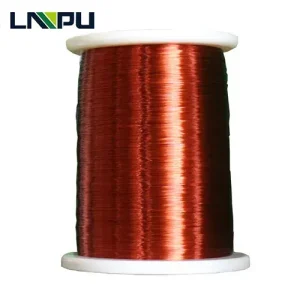
Polyester Or Polyesterimide Overcoated With Polyamide-Imide Enamelled Round Copper Wire, Class 200

Insulation Material Function
Polyester or Polyesterimide Overcoat: The copper wire is first coated with a layer of either polyester or polyesterimide. These materials provide electrical insulation to the copper conductor, preventing short circuits and electrical leakage. Polyester and polyesterimide have good thermal and electrical properties, making them suitable for various temperature conditions.
Polyamide-imide Enamel: Over the polyester or polyesterimide layer, a further layer of polyamide-imide enamel is applied. Polyamide-imide is a high-performance polymer known for its excellent thermal resistance, mechanical strength, and electrical properties. The enamel provides additional insulation and protection to the wire against heat, moisture, and chemicals.
Thermal Class 200
Class 200 is a thermal class that requires a minimum temperature index of 200 and a heat shock temperature of at least 220℃
The temperature in degrees Celsius corresponding to the temperature index is not necessarily that at which it is recommended that the wire be operated and this will depend on many factors, including the type of equipment involved.
The range of a nominal conductor diameters covered by this standard is as follows:
Grade 1: 0.050mm up to and including 2000mm;
Grade 2: 0.05mm up to and including 5000mm
Resistance To Abrasion
(nominal conductor diameters from 0.25mm up to and including 2500mm)
The polyester or polyesterimide overcoat and the polyamide-imide enamel layer help protect the copper conductor from physical damage and abrasion. Polyester and polyesterimide are relatively durable materials that can withstand moderate levels of abrasion. Polyamide-imide, being a high-performance polymer, also offers good resistance to wear and tear.
Feature:
| High Temperature Rating | Rating: The wire is designed to operate continuously at a maximum temperature of 200°C (392°F) |
| Excellent Electrical Insulation | helps prevent electrical leakage, short circuits, and breakdowns, ensuring reliable and safe operation of electrical equipment. |
| Good Thermal Stability | maintain its electrical and mechanical properties even at high temperatures |
| Mechanical Strength | has good mechanical strength, providing resistance against physical stress, bending, and deformation. |
| Chemical Resistance | known for their resistance to various chemicals, oils, solvents, and other substances. |
| Durability | It can withstand normal wear and tear associated with typical electrical applications. |
| Versatility | widely used in motors, transformers, and other electrical equipment. |
Application Areas:
Transformers, Motors, Reactors and Electronic equipment.

